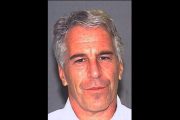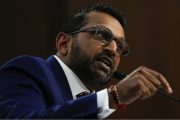The claims were made by Jesus Vicente “El Vicentillo” Zambada-Niebla, who was arrested by the Mexican military in 2009 and extradited to the U.S. for trial on federal drug-trafficking charges. Prosecutors accused him of serving as the “logistical coordinator” for the Sinaloa cartel. He responded earlier this year by invoking a “public authority” defense — essentially arguing that since he was working for the U.S. government under an agreement, he cannot be prosecuted.
The cartel’s arrangement with American officials apparently began through Mexican attorney and Sinaloa-Cartel figure Humberto Loya-Castro sometime before 2004. After being indicted in 1995, Loya eventually agreed to provide information on rival criminal organizations to U.S. authorities.
“In return, the United States government agreed to dismiss the prosecution of the pending case against Loya, not to interfere with his drug trafficking activities and those of the Sinaloa Cartel, to not actively prosecute him … and the leadership of the Sinaloa Cartel, and to not apprehend them,” the motion filed by Zambada-Niebla’s attorney explains.
On top of that, Loya was allowed to sit in on Drug Enforcement Administration (DEA) meetings — even when they had to do with the Sinaloa Cartel. American officials also promised not to share information they had on the organization with the Mexican government.
“In addition, the defense has evidence that from time to time, the leadership of the Sinaloa Cartel was informed by agents of the DEA through Loya that United States government agents and/or Mexican authorities were conducting investigations near the home territories of cartel leaders so that the cartel leaders could take appropriate actions to evade investigators,” the document claims.
Eventually, Zambada-Niebla met directly with U.S. officials in Mexico City “for the purpose of his continuing to provide information to the DEA and the United States government personally, rather than through Loya,” the document says.
Apparently the drug boss was told he would not be arrested and that the agents, who already knew about his cooperation, simply wanted to keep getting information. “Mr. Zambada-Niebla was also told that the arrangements with him had been approved at the highest levels of the United States government,” according to the filing.
Zambada-Niebla supposedly accepted the deal and offered information after being promised that a pending indictment against him would be dismissed and “he would have immunity from arrest, prosecution, and any further charges.”
Shortly after the meeting with American agents, however, Zambada-Niebla was arrested by Mexican authorities. Now he wants the U.S. government documents to prove his story in court, but the feds are apparently not cooperating in full.
Among the evidence sought by the defense are documents pertaining to the now-infamous Operation “Fast and Furious." Under that program, the U.S. federal government — with approval from the highest levels of the administration — deliberately put high-powered American weaponry in the hands of Mexican cartels, often at taxpayer expense. The plan has resulted in thousands of deaths so far, including the slayings of more than a few U.S. and Mexican law-enforcement officers.
“It is clear that some of the weapons were deliberately allowed by the FBI and other government representatives to end up in the hands of the Sinaloa Cartel,” the motion states, arguing that the relevant documents will prove that the U.S. government gave the cartel weapons pursuant to the agreement between Zambada-Niebla’s organization and American officials.
Another important argument made by the defense is that Zambada-Niebla and his alleged associates are hardly the first criminals to receive protection and aid from American authorities. “The United States government and its various agencies have a long history of providing benefits, permission, and immunity to criminals and their organizations to commit crimes, including murder,” notes the motion, citing multiple examples.
Similarly, under the U.S. agreement with the Sinaloa Cartel, the organization’s leaders “were given carte blanche to continue to smuggle tons of illicit drugs into Chicago and the rest of the United States and were also protected by the United States government from arrest and prosecution,” the motion claims. “Indeed, United States government agents aided the leaders of the Sinaloa Cartel.”
Apparently there were many other benefits, too. “United States government agents did not share any of the information they received relating to the Sinaloa Cartel with the Mexican government and the leadership of the Sinaloa Cartel was kept informed of both Mexican and United States government operations in areas near their location,” the document says.
Among the many examples of American agents allowing and protecting wanton criminality by criminals working for them is an extraordinarily heinous crime that Zambada-Niebla’s defense is also seeking information about — the 2003 “House of Death” murders in Juarez. In that case, U.S. government informants slaughtered over a hundred people, even though American officials knew it was going to happen and could have prevented it.
“As confirmed in the Joint Assessment Report prepared by government authorities investigating those murders, agents of the United States government had prior knowledge that murders were going to be committed by their informants but did not take any measures to either inform the Mexican government or the intended victims,” the court filing notes. “The government determined that the killings of over a hundred Mexican citizens was an acceptable price to pay for enabling them to continue their narcotics investigations.”
When news of the “public authority” defense first broke with a court filing earlier this year, it received almost no coverage in the American press despite causing a media firestorm in Latin America. That has changed in recent days, however, with several newspapers and wire services covering the case.
Of course, the U.S. government has been caught smuggling drugs numerous times in recent decades. And the bombshell revelations surrounding Operation Fast and Furious have only added fuel to the fire.
Former FBI and DEA officials cited by Narco News said there is a very real possibility that Zambada-Niebla was indeed working for the U.S. government. As more information comes out, a clearer picture of what was really going on is expected to emerge.
Prosecutors and defense attorneys refused to comment about the case when reached by The New American earlier this year. But in a response filed in late July — right before the most recent motion submitted by the defense — U.S. Attorney Patrick Fitzgerald denied that Zambada-Niebla was operating under “public authority.” He did not, however, deny that Zambada-Niebla was a U.S. government asset, or that there was some type of agreement.
The prosecution has until early-to-mid September to enter a response to the July 29 motion filed by the defense. For now, Zambada-Niebla is being held in solitary confinement in Chicago waiting for trial early next year.
Artist's drawing of Vicente Zambada Niebla: AP Images
Related articles:




